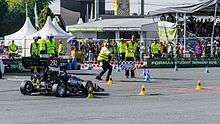Formula Student

Formula Student is a student engineering competition held annually in the UK. Student teams from around the world design, build, test, and race a small-scale formula style racing car. The cars are judged on a number of criteria as listed below. It is run by the Institution of Mechanical Engineers and uses the same rules as the original Formula SAE with supplementary regulations.
The 2016 Formula Student event was held at Silverstone Circuit between the 9 and 12 July 2015.[1]
The current holder of the overall trophy is Rennteam, University of Stuttgart and the top team from the UK is Team Bath Racing from the University of Bath
In 2014 Beth Georgiou took over as Formula Student Project Leader and Tasneem Rahman took over as Formula Student Executive Assistant. Ambassadors of Formula Student include David Brabham, Paddy Lowe, Willem Toet, Leena Gade, Dallas Campbell, Mike Gascoyne, and James Allison.
Class definitions
There are two entry classes in Formula Student, designed to allow progressive learning.
Class 1
This Formula Student car is completely electric powered[2] and it's a confirmed class 1 team for the Formula Student 2016.[3]]]
Is the main event, where teams compete with the cars they have designed and built. Teams are judged across 6 categories and must pass a rigorous inspection by judges before being allowed to compete for the dynamic events. There are usually 100-120 teams in this class.
Class 2
This is a concept class for teams who only have a project and plan for a Class 1 car. It can include any parts or work that has been completed in the project so far but this is not necessary. Teams are judged on business presentation, cost and design. Schools can enter both Class 1 and Class 2 cars, allowing Class 2 to be used for inexperienced students to practise their development in advance of a full Class 1 entry.
Class 1A (pre-2012)

This was an alternative fueled class with the emphasis placed upon the environmental impact of racing. A car from the previous year's Class 1 entry could be re-entered and re-engineered allowing the students to concentrate on the low carbon aspect of the competition without having to redesign a new chassis and ancillaries. Cars in Class 1A were judged in the same events alongside Class 1 however the cost category was replaced by one for sustainability and the endurance event had a greater emphasis placed upon measured emissions. Class 1A cars were scored and ranked independently of Class 1. Since 2012, both Petroleum and Alternative fueled cars have competed for places in the same rankings.
Class 2A (pre-2012)
This was a concept class for teams who only had a project and plan for a Class 1A car. It could include any physical parts or work that had been completed for the project so far, but was not essential. Teams were judged on business presentation, cost and design. Schools could enter both Class 1A and Class 2A teams, with Class 2A allowing inexperienced students to gain competition experience in preparation for a full Class 1A entry.
Judging
The cars are judged by industry specialists on the following criteria:
Static Events
- Engineering Design (150 points)
- Cost & Sustainability Analysis (100 points)
- Business Presentation (75 points)
- Technical Inspection (comprising 6 tests): Safety, Chassis, Noise, Tilt, Brake, and Tech (no points)
Dynamic Events
- Skidpad (Figure of 8) (50 points)
- 1 km Autocross/Sprint (150 points)
- 75m acceleration (75 points)
- 22 km endurance (300 points) and fuel economy (100 points)
The winner of the event is the team with the highest number of points out of a maximum of 1000.[4]
Venues
The first event was held at the Motor Industry Research Association (MIRA) proving ground in 1998. Following that, the event was held for three years at the NEC Birmingham between 1999 and 2001. The event was then held on the Go-Kart track at Bruntingthorpe Aerodrome between 2002 and 2006, before moving to Silverstone Circuit in 2007 where the competition remains until this day. The dynamic events have taken place on Luffield and Brooklands corners in the past but 2012 saw Copse corner and the National Circuit pit straight being used.
Winners
Most wins
| Team | Class 1 wins |
|---|---|
| |
4 |
| |
3 |
| |
2 |
| | |
| | |
| |
1 |
| | |
| | |
| | |
| | |
| |
Support
- Patron: Ross Brawn (former team principal of Mercedes Formula One team),
- Ambassador: The Rt Hon Lord Drayson of Kensington (Minister of Science)
Notable judges
- Carroll Smith
- Jon Hilton - Flybrid systems, ex Renault F1
- Andrew Deakin - Renault F1
- Chief Judge - Richard Folkson, ex Ford
- Neil Anderson
- Willem Toet - Sauber F1
- Alex Hickson - GKN Aerospace Filton UK
- Dan Jones - Flybrid Systems
- Allan Staniforth
- David Gould - Gould Racing
- Claude Rouelle - OptimumG
- Pat Clarke
- Nick Vaughan
- Matt Wilkin - Brawn GP
- Ben Michell - Dunlop Tyres
See also
- Formula SAE
- UH Racing
- Team Bath Racing
- Cardiff Racing
- Oxford Brookes Racing
- University of Birmingham Racing
- Formula SAE Australasia
- DJS Racing
- University of Patras Formula Student Team - UoP Racing Team
- Swansea University Race Engineering
References
- ↑ IMechE (2015) Formula Student, Available at: http://events.imeche.org/formula-student/ (Accessed: 22 April 2015).
- ↑ "Monoplaça 100% elèctric 'Made in Terrassa'" [100% electric car 'Mad in Terrassa']. Terrassa Notícies (in Catalan). Terrassa. 23 May 2016. Retrieved 9 June 2016.
- ↑ "Team Registration". Institution of Mechanical Engineers. Retrieved 17 June 2016.
- ↑ Formula Student 2013 Rules